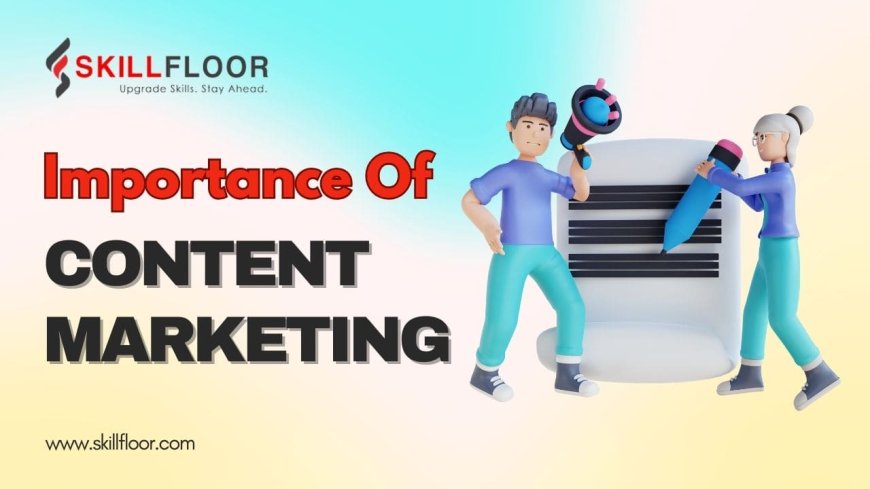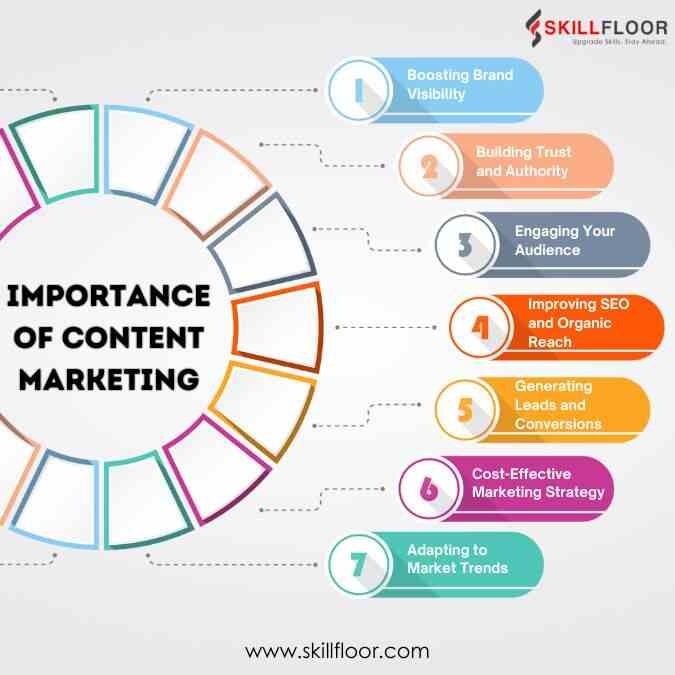Importance Of Content Marketing
Learn how content marketing boosts brand recognition, interaction, and sales. Get practical tips and perks of using it.

The importance of content marketing is clear in the modern online world. It’s a key part of digital marketing that helps businesses connect with their audience in meaningful ways. By sharing useful information regularly, companies can build trust with their customers. This trust leads to customer loyalty, which is essential for any business. Content marketing is about more than just selling products; it's about offering helpful advice and insights that meet the needs of your audience.
Including the importance of content marketing in your digital strategy can improve your search engine rankings. When you create high-quality content that people find interesting, they spend more time on your website. This can lower bounce rates and increase the chances that visitors will become customers. Search engines also like websites that update their content often, so having a content marketing plan is good for SEO. Using different types of content like blogs, videos, and infographics can help you reach more people and keep things fresh and engaging.
Knowing the importance of content marketing also means understanding how it supports other parts of digital marketing. It works well with social media, email campaigns, and paid ads by ensuring your message is consistent everywhere. Content marketing helps guide potential customers through the buying process by providing valuable information at each step. By making content marketing a part of your digital marketing efforts, you can engage better with your audience, increase conversions, and build a stronger online presence.
Boosting Brand Visibility
One major benefit of content marketing is increased brand visibility. By consistently creating high-quality content, businesses can position themselves as industry leaders. This helps in reaching a broader audience. For example, a well-written blog post can appear in search results, drawing in potential customers looking for information about your products or services.
Building Trust and Authority
Trust is essential for any business relationship. Content marketing allows businesses to build trust with their audience by providing valuable information that addresses their needs. When a company consistently delivers helpful content, it becomes a trusted resource.
Engaging Your Audience
Engaging content is key to maintaining a relationship with your audience. Content marketing offers various ways to keep your audience interested. Interactive content like quizzes, surveys, and polls can attract attention and encourage participation. Similarly, interesting stories, informative articles, and entertaining videos can keep your audience engaged.
Improving SEO and Organic Reach
Search Engine Optimization (SEO) is another critical aspect of content marketing. High-quality, relevant content is one of the main factors that search engines consider when ranking websites. By using targeted keywords, businesses can improve their search engine rankings and increase organic traffic to their site.
Generating Leads and Conversions
Effective content marketing drives lead generation and conversions. By providing valuable content that addresses the pain points of your target audience, you can attract potential customers who are looking for solutions. Once they are on your website, strategically placed calls-to-action (CTAs) can guide them through the conversion funnel.
Cost-Effective Marketing Strategy
Compared to traditional marketing methods, content marketing is cost-effective. While it requires an investment of time and resources to create high-quality content, the long-term benefits are significant. A blog post published today can continue to drive traffic and generate leads for months or even years.
Adapting to Market Trends
The business world is always changing, and content marketing provides the flexibility to adapt to these changes. By staying informed about the latest trends and shifts in consumer behavior, businesses can create timely content that addresses current issues and opportunities.

Implement an Effective Content Marketing Strategy
-
Define Your Goals and Audience: Before you start creating content, it's important to clearly outline what you want to achieve and who you're targeting. Understanding your objectives and knowing your audience demographics will help tailor your content strategy to better meet their specific needs and preferences.
-
Create High-Quality Content: Quality is essential when it comes to content creation. Make sure your content is relevant, informative, and engaging for your audience. By focusing on producing valuable content, you'll establish credibility, build trust, and keep your audience interested in what you have to say.
-
Optimize for SEO: To improve your content's visibility on search engines, it's crucial to strategically incorporate relevant keywords throughout your content. Additionally, optimizing meta tags like title tags and meta descriptions can help accurately represent your content and attract organic traffic to your website.
-
Promote Across Channels: Don't limit your content distribution to just one platform. Utilize various channels such as social media marketing, email marketing, and guest blogging to reach a wider audience and increase your content's exposure. Tailor your promotional efforts to suit each platform's unique audience and engagement dynamics for the best results.
-
Measure and Iterate: Keep track of how your content is performing by regularly monitoring metrics like traffic, engagement, and conversions using analytics tools. Analyze the data to identify trends and areas for improvement. Use these insights to refine your content strategy, tweak your approach, and ensure continued success.
What types of content are most effective for content marketing?
In content marketing, it's all about finding what works best for your audience and goals. Different formats serve different purposes, so having a variety to choose from is key. Blog posts dive deep into topics, often with visuals and links for more info. Videos are great for grabbing attention and delivering information in a fun way. Infographics make data easy to understand and share with eye-catching graphics. Podcasts let people listen and learn on the move. Case studies show how products or services solve problems in real life, building trust. Lastly, ebooks provide thorough guides and resources, establishing authority in a field. By using these different types of content, you can connect with your audience in the most effective way possible.
Content marketing is a powerful tool that offers numerous benefits to businesses of all sizes. From enhancing brand visibility and building trust to driving engagement and supporting other marketing strategies, its importance cannot be overstated. By investing in high-quality content and maintaining a consistent strategy, businesses can achieve long-term success and create meaningful connections with their audience.




























































